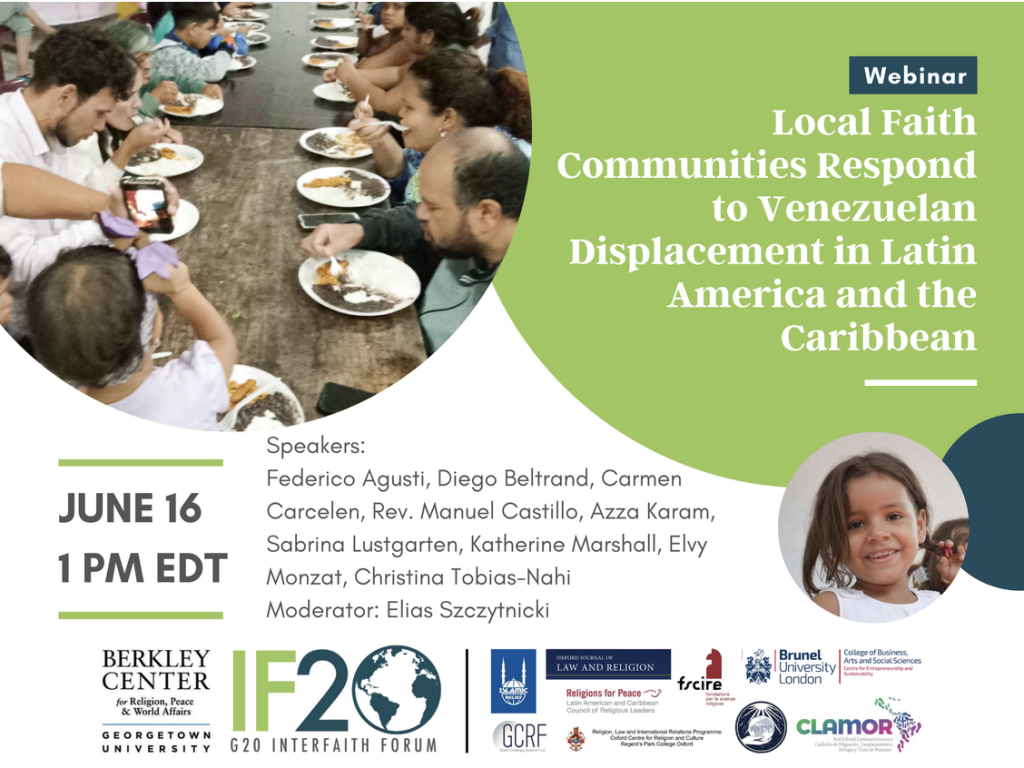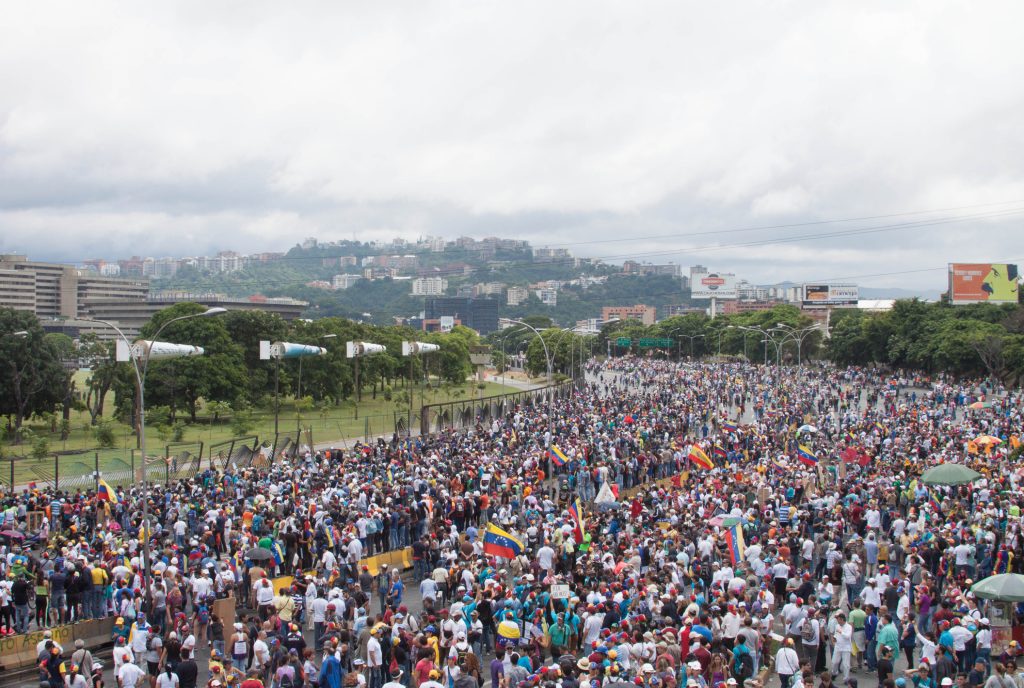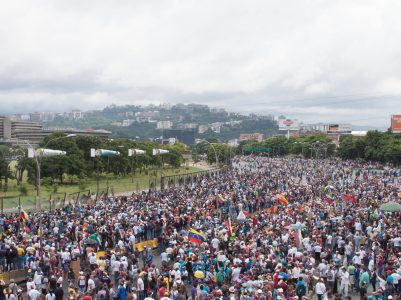By JoAnne Wadsworth, Communications Consultant, G20 Interfaith Forum
– – –
On Wednesday, June 16th, the G20 Interfaith Forum held a webinar organized by its Working Group on Refugees, Displacement, and Migration: “Local Faith Communities Respond to Venezuelan Displacement in Latin America and the Caribbean.” The event was co-organized and co-sponsored by the Berkley Center for Religion, Peace & World Affairs at Georgetown University and supported by Religions for Peace; Islamic Relief USA; the Fondazione per le scienze religiose (FSCIRE); the Oxford Journal of Law and Religion; Brunel University London’s College of Business, Arts and Social Sciences; CLAMOR; the World Faiths Development Dialogue; the Religion, Law and International Relations Programme at Regent’s Park College Oxford; and the Global Challenges Research Fund (GCRF).
Panelists included Rev. Manuel Castillo, pastor of the First Evangelical Baptist Church of Lima (PIEBL) and member of the Interreligious Committee for Refugees and Migrants in Peru (CIREMI); Carmen Carcelén, coordinator of Casa de Acogida Juncal, Ecuador; Diego Beltrand, director general’s special envoy for the regional response to the Venezuela situation at the International Organization for Migration (IOM); Elvy Monzat, Executive Director of CLAMOR network; Sabrina Lustgarten, executive vice president of HIAS; Frederico Agusti, representative in Peru for the United Nations High Commissioner for Refugees (UNHCR); Martin Coria, regional director for Latin America and the Caribbean at Church World Service (CWS); Christina Tobias-Nahi, director of public affairs at Islamic Relief USA and head of the IF20 Refugees Working Group; and Azza Karam, secretary general of Religions for Peace International. Katherine Marshall (Berkley Center Senior Fellow and IF20 Vice President) and Elías Szczytnicki (director of the Latin American and Caribbean Regional Office of Religions for Peace) moderated the discussion.

Katherine Marshall introduced the issue at hand and highlighted the urgent need to better understand the role that religious actors and organizations are playing on the “ground level” in the Latin American countries most affected by the current Venezuela crisis. Elias Szczytnicki elaborated on the scale of the crisis; the Venezuelan Refugee Crisis is now the second-largest in the world (after Syria), stressing the commitment of Religions for Peace to helping the situation of refugees and migrants across the world. He invited the speakers to share what they and their organizations have done and are doing to help during the crisis.
Rev. Manuel Castillo
Castillo, who leads a large Baptist faith community in Lima, Peru, detailed the initial motivation that led them to help refugees and the additional challenges that have arisen with the onset of the pandemic.
“The first question we asked was ‘What would Jesus do if he were in our place in this context?’ We saw the Venezuelan migrants come to us and knock on our doors, and we decided to open our doors to them and give them love and respect, even though we didn’t have any plan. God has allowed us to be witnesses to a wide scope of opportunities to truly help those in need.”
Refugees, he stressed, were the first community affected by the pandemic worldwide—and that they’d almost immediately lost their informal work and began to go hungry, in addition to losing loved ones to the virus. Through partnerships and friendships, Castillo’s church has been able to provide three meals a day to refugees and migrants throughout the crisis.
Carmen Carcelén
Carcelén initially opened her home as a hostel to migrants based on a desire to serve and fulfill the will of God, and has hosted and helped thousands of migrants over the past four years.
“God gave me a large house and a big family. I had plates, I had a kitchen, I had saucepans, and I wanted to help. So, it hasn’t been that hard to take the steps that I have taken. I want to keep helping out, and to do so in a selfless way. I think I still have the ability and the strength to give more—I’ve been able to open my wings and fly like an eagle.”
She expressed her sincere thanks for the opportunity to meet so many others working for the same cause, and emphasized that finding a way to help the Venezuelans (and people in need the world over) is finding a way to fulfill the will of God.
Diego Beltrand
Beltrand focused his comments on the difference faith based organizations and communities are making in the crisis, seen from his perspective (IOM) and overview of the crisis overall. At critical junctures where governments and large organizations are slower to act, religious actors have the ability to actively help and meet immediate needs on the ground—in addition to playing a crucial role in public policy, integration, development, etc.
“More than 4.6 million refugees and migrants have left Venezuela. They’re already very vulnerable through the inherent risks of their travels, and COVID-19 has added other devastating factors to their experiences. The Venezuelan refugee crisis is going to continue for a time, and protection and documentation for these people will only be more important as time goes on. The role of religious organizations will continue to be fundamental.”
Elvy Monzat
Monzat took a deep look at the united efforts of the Catholic Church throughout the crisis, led by the CLAMOR network, which was created by Pope Francis to work on human mobility topics. The network is currently undertaking 662 projects in 153 Latin American and Caribbean cities to welcome migrants and help them in their development.
“This is a very vulnerable population, and we know that cultural and political integration are the key to helping make sure that they [migrants] are guaranteed their rights in cultures of solidarity, fraternity, and peace. We want to not just be the voice of the voiceless, but to help them get their voices back and be directly heard. We want to remove the barriers between these people and their dreams.”

Sabrina Lustgarten
Lustgarten focused her comments on the efforts of HIAS, the oldest major religious humanitarian network in the world, founded by the Jewish faith. The organization is currently providing services to migrants through 44 offices in the border areas of nine Latin American and Caribbean countries—focusing on helping migrants gain access to essential protection services like legal aid, psychosocial support, and financial support.
“COVID-19 has stagnated education, pulled the poor into deeper poverty, and subjected the vulnerable to increased violence. Every risk that Venezuelan migrants were already facing has been exacerbated by the pandemic. Xenophobia is rising. Gender-based violence has increased. Livelihoods have been lost. Border closures and controls have increased legal and practical complexities. Access to documentation is the first critical step to promote inclusion of this population. We need highly defined humanitarian relief efforts to help them.”
Frederico Agusti
Agusti talked about the powerful results that are seen when religious organizations unite and collaborate with each other and with other large relief networks, like the UNHCR, on these crises. Religious organizations are typically the “first responders” in crises like the Venezuelan refugee crisis, providing much-needed food and immediate help. Later, efforts can be made to help people to become more self-reliant.
“The work that religious organizations do—giving food, giving guidance, helping with education, providing protection, creating awareness—all of it is pivotal in order to protect refugees and migrants. This is part of what Pope Francis was saying: Welcome, Protect, Promote, and Integrate. And all of those are reflected in the work of faith organizations in Latin America. We are a team, and I know that together we will be able to come up with better, more efficient responses.”
Martin Coria
Coria, who works with Church World Service (CWS) in Latin America, highlighted research his organization had carried out on faith-based communities in the crisis and detailed the strengths and weaknesses of local faith communities in addressing these challenges: They can move quickly and are crucial for immediate and urgent responses. However, there are also risks to address, in that they can also be easily influenced by local prejudice and bias.
“To talk about local faith communities who provide support is to talk about faith in action, and also about diversity. Two faith group’s responses might be very different in the same town. The local faith community has great potential in regard to addressing the needs of the displaced, especially in cities, but now more than ever, we need a more balanced approach that avoids the prejudices of local faith communities.”
Closing Remarks
Marshall thanked the panelists for their rich and challenging witness of responses to the crisis, and summed up questions presented by listeners. She focused on the challenges involved in integrating the systems and responses from religious worlds in the essential work of tackling regional and global dimensions of the growing refugee crisis.
“This crisis is one where far too little is known and discussed; the scale of the partnerships that have developed around it needs to be better known.”
Christina Tobias-Nahi as head of the IF20 Refugees Working Group and Azza Karam as Secretary General of Religions for Peace broadened the discussion in their remarks.
Tobias-Nahi referenced her experiences working with Islamic Relief, and outlined four priorities or “benchmarks” that the organization is aiming for in their work with refugees:
- One family member has a source of income
- That they have adequate shelter
- That they’re receiving three meals a day
- That they’re becoming active participants in society
She encouraged all participants to reach out to the working group to assist in making wise and informed recommendations to the G20 on these urgent issues.
Karam highlighted the crisis as an opportunity to serve the mission of faith and belief that is exemplified by the organizations who participated in the meeting. She emphasized the important role that religions play in the international development and humanitarian space, and challenged faith-based organizations and communities to “radically and dramatically change the way they serve” by creating more partnerships and collaborations, working together across religious and other boundaries.
“It is the faith-based and faith-inspired who speak the language, the narrative, and the theology of love—which is especially needed for those who have lost everything. This meeting is not to be taken for granted.”
– – –
JoAnne Wadsworth is a Communications Consultant for the G20 Interfaith Association and acting editor of the “Viewpoints” blog. To see more on the webinar, including links to the video recording when it’s available, see the event page.


